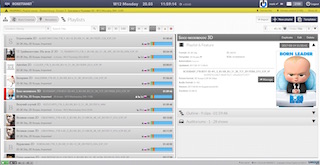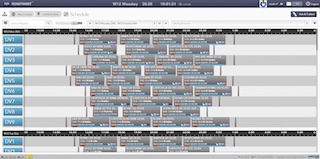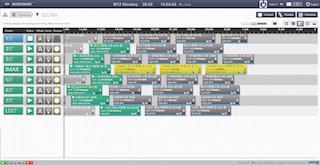 For more than a decade, theatre management software has been the backbone of every cinema that made the transition to digital projection technology, which is to say, virtually every movie theatre in the world. Many different manufacturers provide their own approach to the challenges that TMS was designed to address. I recently spoke with five TMS manufacturers and asked if they thought exhibitors were getting the most from their TMS, where their TMS fits in a movie theatre enterprise and, most of all, what new ideas in TMS can we expect to see when the industry gathers in Las Vegas next week for CinemaCon 2017. We’re presenting the companies alphabetically and will be offering their answers over the next five days. Today’s company: Unique Digital.
For more than a decade, theatre management software has been the backbone of every cinema that made the transition to digital projection technology, which is to say, virtually every movie theatre in the world. Many different manufacturers provide their own approach to the challenges that TMS was designed to address. I recently spoke with five TMS manufacturers and asked if they thought exhibitors were getting the most from their TMS, where their TMS fits in a movie theatre enterprise and, most of all, what new ideas in TMS can we expect to see when the industry gathers in Las Vegas next week for CinemaCon 2017. We’re presenting the companies alphabetically and will be offering their answers over the next five days. Today’s company: Unique Digital.
Digital Cinema Report: Do exhibitors fully understand all the benefits that TMS can provide?
Mark Stephen, director of sales, Unique Digital: Fair comment, its not only a lack of potential process of workflow at site that can be optimised with an intelligent TMS, but also I think there is a real lack of knowledge as to how powerful an eTMS can be. Estate management from a central point provides conformity, control and operational savings at each site. The U.S. is a little behind in some of the pre-show integrations available. Getting a footprint and getting advertising house buy-in is the key here, we are working on both to implement automated pre-show in our U.S. footprint. Perhaps the current perception of a TMS is something at site that centralizes the booth. The reality is that the TMS ‘is something at the site that coordinates the show’, it’s a big difference.
DCR: Can TMS be used to manage and improve the lobby experience or POS purchasing?
MS: Our TMS does integrate with POS systems – mostly for schedule transfer purposes. Our TMS does provide a booth operations monitoring screen for front of house. But if I said to you a TMS product could have a direct influence in brand building, customer [loyalty] building or other such marketing activities, then I would be spinning you a yarn. It simply doesn’t work in that space, it talks to it, but doesn’t operate in it.
 DCR: Several exhibitors have expressed interest in TMS that could better schedule event cinema programs. Is that something you've encountered?
DCR: Several exhibitors have expressed interest in TMS that could better schedule event cinema programs. Is that something you've encountered?
MS: It’s a problem we have long been aware of and only recently solved. The issue was that the satellite feed was a totally different piece of kit, plugged into [the] cinema world by an HDMI. Any further attempts at automation and integrations to date have been troubled at best, not as reliable as hoped, and not truly integrated into the show structure of the cinema operations.
While things have got better, event cinema is still exactly that, it’s not only an event for the audience but for the cinema team as well. Until you can address the differing nature of the satellite equipment with the requirements of the digital cinema kit within the booth then you will have problems (or great cost) addressing true integration.
Consider our championing of broadband versus satellite with our Movie Transit DCP delivery network, which is a broadband streaming solution for event cinema. Think AppleTv for cinema: one per screen, low cost, no roofing rights for dishes, no scraping snow from the dish, etc.
It all comes back to how software can help out and I think that’s the real education required. What our RosettaLive offers is the normalization of event cinema into the cinema process. What RosettaNet offers is rationalizing of that cinema process to a central point of excellence. Where the clever thinking is in revolutionizing that process – not adhering to it, or making it easier as it is – but changing it.
 DCR: What improvements and advances in TMS can we expect to see at CinemaCon 2017?
DCR: What improvements and advances in TMS can we expect to see at CinemaCon 2017?
MS: The role and requirement for the TMS is firmly established in the minds of exhibition, it is seen as the key tool in the booth. With this acceptance of the core tasks that a TMS can provide, it is the additional intelligence of the TMS product that will be the focus at CinemaCon 2017.
Exhibitors are keen to understand just what a TMS can bring to their operations. It’s so much more than centralizing content management, playlist building and scheduling functions. Our RosettaBridge TMS product is under continual development to optimize performance and operation and to stay one step ahead of the booth developments being installed now.
In terms of feature set, we have a dual focus for CinemaCon 2017:
Autonomous Cinema. Based on RosettaBridge TMS, a hands-off solution to exhibition. Taking the lead from the schedule made in the POS, our Autonomous Cinema solution manages the entire booth operation at site including content management, show build & schedule thru to exhibition on screen. Deeper integration with sites environmental systems to manage the building effectively is key.
Event Cinema Integration. For too long we feel event cinema has been an unnecessary burden on the cinema’s operations team – with RosettaLive we are able to mainstream the provision of live feeds to screen – enabling the scheduling of the event in advance, the ability to manage the preshow and intermission. We have provided a regular workflow to the exhibition of event cinema.
